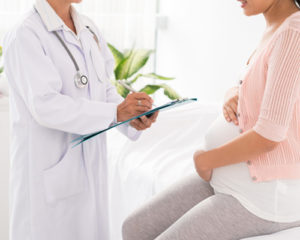Abusing alcohol or drugs can change your brain’s chemical makeup, leading to dependence and addiction. Intoxicating substances can also harm your body, leading to stomach, liver, heart, lung, kidney, and immune system damage. If you’re pregnant, abusing alcohol or drugs will not just harm you, but your developing baby as well.
The National Institute on Drug Abuse (NIDA) notes that recent studies have discovered that the abuse of opioid painkillers, tobacco, and marijuana during pregnancy can double or triple the risk of stillbirth.
Some drugs like alcohol, barbiturates, benzodiazepines, and even caffeine may lead to some withdrawal syndromes in children after birth, with symptoms like neonatal abstinence syndrome (NAS). About 5 percent of women abuse at least one addictive substance during their pregnancy.
Any nutrients a woman takes in during pregnancy cross the placenta or through the umbilical cord to the baby. This includes food, oxygen, water, and intoxicating substances like alcohol, nicotine, opioids, prescription sedatives, and illicit drugs like marijuana or cocaine.
When an infant is born to a mother struggling with substance abuse and addiction, the child will likely:
- Have low birthweight
- Be born prematurely
- Have birth defects
- Have a small head circumference
- Be at greater risk of sudden infant death syndrome (SIDS)
What Do Pregnant Women Need In Addiction Treatment?
A national survey in 2012 found that women make up 40 percent of people with a lifetime drug use disorder or addiction. 26 percent of those women meet the criteria for both alcohol and drug addiction in the 12 months before the survey. Women in their reproductive years (18 to 44 years old, especially young women ages 18 to 29) were the most at risk for abusing drugs or alcohol. That year, nearly 6 percent of pregnant women struggled with illicit drugs, 8.5 percent drank alcohol, and 15.9 percent smoked cigarettes. As a result, there were 380,000 infants exposed in utero to illicit drugs, more than 550,000 exposed to alcohol, and more than 1 million exposed to tobacco.
Between 2000 and 2009, the U.S. experienced a fivefold increase in opioid addiction and abuse among pregnant women, leading to higher rates of neonatal abstinence syndrome (NAS).

The American Society of Addiction Medicine (ASAM) reports that women with an addiction to drugs or alcohol are more likely to have an unplanned pregnancy. About 50 percent of pregnancies in the United States are unplanned, but among women struggling with addiction, the rate may be as much as 80 percent.
This demographic is also much more likely to suffer from co-occurring mental illnesses. The stress associated with pregnancy, mental conditions, and/or addiction increases the risk that the woman will: Not get appropriate prenatal care Suffer from poor nutrition Experience worsening symptoms of the mental illness Have a harder time sticking to addiction treatment plans
The stress of pregnancy is made worse for women dealing with domestic violence or abuse, making this group more likely to struggle with substance abuse and/or co-occurring mental illnesses.
Treatment programs that focus on helping pregnant women end addiction to drugs or alcohol must provide many additional resources to help this vulnerable demographic. The health of the mother and baby must be addressed during and immediately after the pregnancy.
The woman’s financial, housing, employment, and community situations must be considered as well. Helping the new mother find work, education, housing, support groups, individual counseling, and financial resources to cover these needs, along with support for the ongoing recovery process, should be part of the intake, treatment, and aftercare process.
ASAM recommends the following to help pregnant women during detox and rehabilitation:
- Prenatal visits should include screening for addiction or substance abuse.
- Pregnant women should be given priority access to addiction treatment.
- Prenatal visits or substance abuse treatment intake processes should screen for drug-associated diseases like hepatitis B or C as well as HIV/AIDS because these can impact the new mother’s ability to breastfeed.
- Pregnant women should be screened for depression, anxiety, and other mental health conditions during prenatal visits and/or during the rehabilitation intake process.
- Pregnant women should be asked if they want drug testing.
- During detox, if a pregnant woman is prescribed methadone or buprenorphine, she must be informed of the potential risks and sign that she acknowledges these risks.
- Women who are prescribed maintenance medications like methadone or buprenorphine do not benefit from tapering or medically supervised withdrawal if they are physically stable, as this can increase harmful outcomes for the infant.
- Childcare, transportation, reproductive health, nutrition, and parenting classes must all be aspects of addiction treatment for pregnant women and new mothers.
If social or community services take too long to begin, the woman is unsafe at home, or she has severe addiction struggles including multiple instances of relapse, unresolved child-related struggles, or profound co-occurring disorders, long-term residential treatment may be the most appropriate solution to help pregnant women and new mothers. Pregnant women must have this option when finding the best substance abuse treatment program. Many other women find that outpatient treatment works well, allowing them flexibility for doctors’ appointments and to spend with their new baby.
Evidence-Based, Medically Supervised Treatment
If a child is born in withdrawal from a substance the mother abused during pregnancy, symptoms can be uncomfortable and potentially life-threatening. The amount of time an infant experiences withdrawal can depend on the child’s birth weight—if they were born underweight—and if they were born prematurely.
Some General Withdrawal Symptoms An Infant May Experience Include:
- Blotchy skin
- High-pitched, excessive crying or keening
- Sweating
- Stuffy nose
- Sneezing a lot
- Sleep problems
- Irritability
- Increased muscle tone
- Hyperactive Reflexes
- Diarrhea
- Poor feeding
- Slow weight gain
- Nausea and vomiting
- Abnormal sucking reflex
- Fever
- Rapid breathing
- Tremors or shaking
- Seizures
Medical oversight during pregnancy and after birth can help to manage these symptoms and avoid life-threatening problems. NIDA has found that evidence-based treatment for pregnant women and new mothers is similar to that used for anyone else; it should include medically supervised detox, screening for co-occurring conditions and chronic health issues, application of medication as needed, behavioral therapy through rehabilitation, and an aftercare plan.
For some women who struggle with opioid addiction, the use of maintenance medications like methadone and buprenorphine during pregnancy has been a controversial topic. Methadone has been associated with NAS, but most clinicians believe that physical and psychological stabilization, along with greater access to medical treatment for the infant, outweighs any benefits of quitting cold turkey or risking relapse back into high-volume opioid abuse. Recently, buprenorphine has been shown to cause fewer withdrawal symptoms in infants compared to methadone, so this more popular tapering medication may be a better option for pregnant women.
Finding Rehabilitation Programs for Pregnant Women

If you are pregnant and struggling with addiction, there are several ways you can find help. One of the leading resources is the Substance Abuse and Mental Health Services Administration (SAMHSA). They offer a national helpline and online treatment finder, so you can find treatment programs that focus on pregnant women near you.
The National Pregnancy Helpline also offers a lot of information on specific drugs of abuse, state laws that may affect you, and phone numbers to find treatment resources for you, a pregnant loved one, and/or your child.
The Office of Women’s Health (OWH), managed through the U.S. Department of Health and Human Services (DHHS) offers a wide range of online information and resources to help any pregnant woman.
Evidence-based treatment can help pregnant women overcome addiction just like this approach helps people from any demographic. There are special considerations for pregnant women in addiction treatment so it’s important to find a program that is medically equipped to treat pregnant women and their babies. Coordinating specific social services for pregnant women is crucial, so ask a rehabilitation program if they offer prenatal care and child care, financial assistance, management of education or job training, and anything else you need as a pregnant woman or new mother in recovery.
Here at Delphi, we offer comprehensive treatment programs for those who are pregnant and struggling with substance abuse. We will work with you to find a plan that is best for both you and your child both in terms of safety and successful recovery. Our addiction specialists are on-call 24/7 to provide a free assessment and to help you begin the path to a safe pregnancy and a life free from addiction. Give us a call right now at 844-605-0706.

